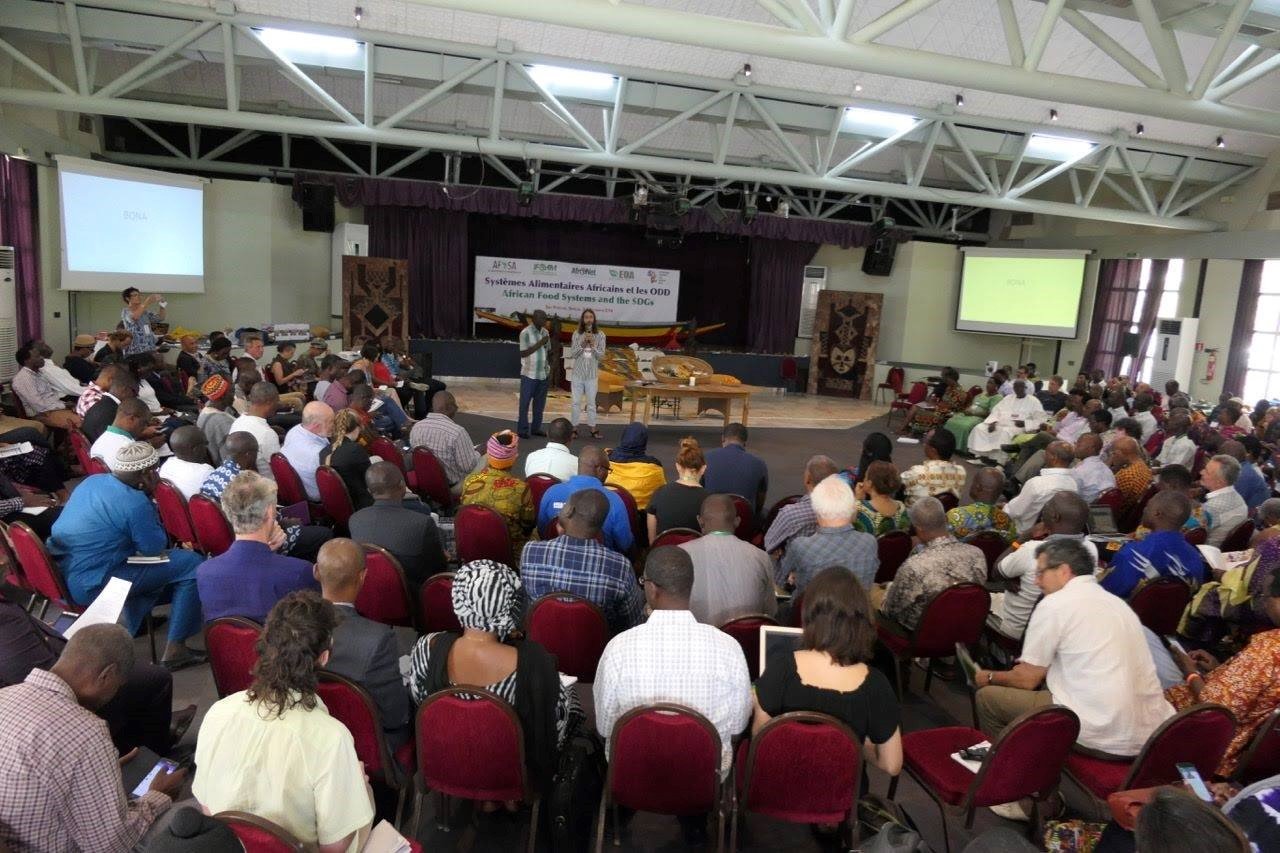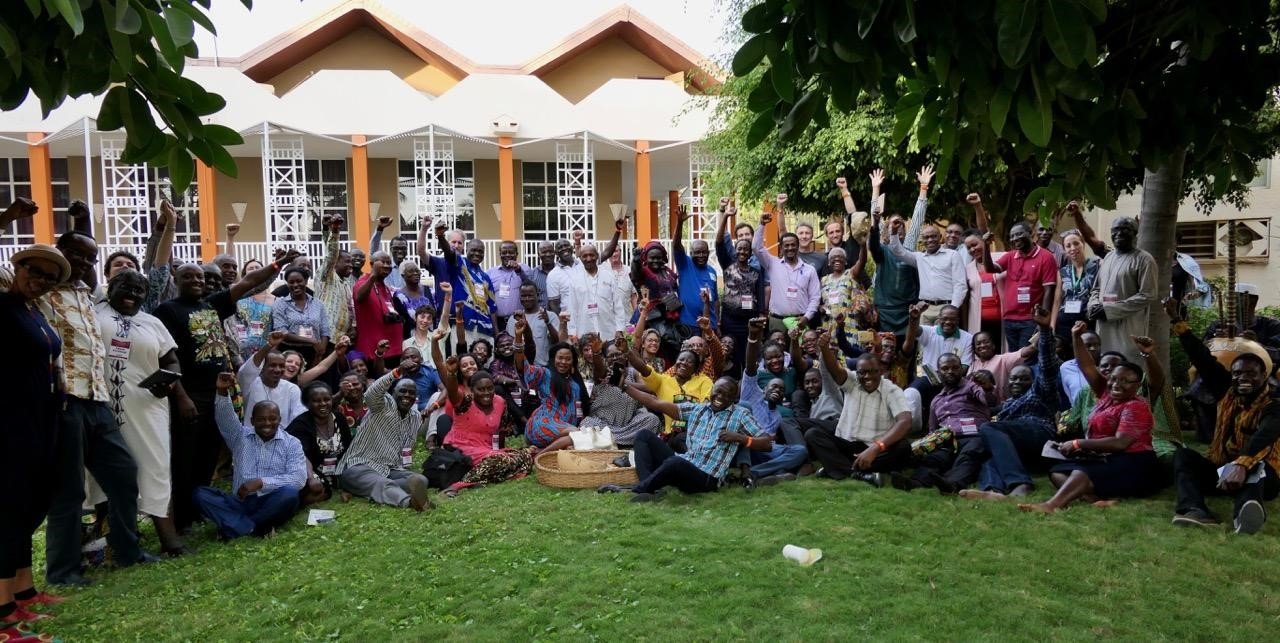African Food Systems and the SDGs Conference - Senegal
Alliance for Food Sovereignty in Africa (AFSA), African Food Systems and the SDGs Conference, 3 – 5 November 2018, Saly, Senegal
Blog by Andy EganThis was my first ASFA conference, with ITF joining the alliance as a Friend of AFSA last year. The conference took place at the Palm Beach Hotel in Saly Portudal in Senegal. The 150 participants joined with the mainly tourist crowd at the hotel enjoying the sunshine, pool, beach and holiday fun activities.
The conference set out to be different and used art as the main medium. Yes there were a few talks but almost no PowerPoints. Much more happened through song, dance, poems, personal writing and reflection. The facilitators from South Africa and created a wonderful energy within the conference room. We even did some clay modelling and used our creations to share their meaning with others in small groups. There was some impressive talent in the room, not shared by me. My avocado did represent one of the key parts of my diet and one of the trees often grown by some of the farmers we support.
The conference definitely succeeded as a celebration and appreciation of both the diversity and unity of the food sovereignty and agroecology movement across Africa.
The conference also gave the opportunity to launch AFSA’s new animation short – Agroecology for Africa – which you can watch here. And a new rich and insightful report on Farmer Managed Seed Systems – The Real Seed Producers – published by AFSA and GRAIN.
In the evening on the first day we gathered around a fire on the beach and took it in turns to read out our ‘burning question’ that we had written down earlier and then throw it into the flames. My question was “How do we unify the growing plant based food movement and the food sovereignty movement in Africa?”
On the second day we created 12 mini-parliaments where there were very rich and informative discussions drawing on the wealth of expertise in each parliament. I found this the most rewarding element and it would have been great to have more time to share and learn from each other in this way.
On the third day we started with a writing activity about something that was important to us personally. This was based on the concept of a ‘Little Book’; one piece of A4 piece paper folded up to create a small 8 page book. I wrote “The Little Book of Trees” which is now part of a library of ‘Little Books’ in South Africa. I hope to be reunited with my Little Book one day!
I was reflecting that we had missed some initial grounding on what exactly are ‘African Food Systems’ and what do they look like today? And how are they changing? This is of course assuming that this information is known across such a huge continent. We know that globally smallholder famers produce 70% of the food we eat using only 30% of the land. And that the majority of farming across Africa is done by smallholder family farmers. But how many of these farmers have food sovereignty and how many are practising agroecology? Is the movement growing? Or is the push by agribusiness and Western ‘philanthropists’ to expand chemical and synthetic farming holding sway?
In the afternoon there were five workshops on key themes and I joined the one on climate change. Our task was to agree on what AFSA’s approach to this issue should be as five key points. We heard how climate change is affecting farming, pastoralism, fishing and is causing desertification, salinization, land loss and creating human conflict. There was consensus that indigenous systems are more resilient to climate changes and that industrial agriculture is in itself contributing significantly to climate chaos. After listening carefully to the contributions I noted down my tentative suggestions were for AFSA to:
(1) Advocate for a universal human right to a healthy and sustainable environment;
(2) Promote agroecology as the most healthy and sustainable method of food production;
(3) Demand an end to fossil fuel extraction, deforestation and infiltration of industrial agribusiness in Africa;
(4) Support wider adoption of agroecology by smallholder farmers across Africa;
(5) Restore tree cover to overcome desertification and land degradation and build resilience
One participant, Solomon Kebede, summarised their experience with these words: “This is the first time for me to see how powerful is art in advancing a common cause in nonconventional but in deep serenity and revealing manner. The parliamentary approach and attempts to formatting thoughts in soft soil were extraordinarily para excellence and supra hypnotizing in transforming our thoughts and desire into multivariable physical and tangible structures!”
And another, Lawrence Sisitka, as follows: “The meeting was both inspiring and humbling: inspiring through the creative facilitation process and the wonderful manner in which everyone rose to the occasion with their own creative contributions; and humbling through being surrounded by so many truly good people, committed to and working for a better world for farmers and for everyone, and for the planet itself.”
After the three day conference I then participated in the follow on AFSA strategy day. The main purpose was to agree a new campaign focus for AFSA. The results of an online survey of members were shared and we then discussed the main options identified in small groups with each group voting for their choice.
There were two options that gained most votes. One was seed sovereignty. And the top choice was Promoting agroecology for climate action. We then worked in groups to develop a framework for the new campaign. This for me was important as it produced a tangible outcome from the conference and gives AFSA a clear sense of direction and common purpose to organise around.
In keeping with the conference theme and the new campaign I was inspired to write a poem during the session; motivated by thinking about how we can popularise agroecology through art. And offer this as my humble contribution:
What is agroecology?
Agroecology is for food sovereignty
Agroecology is for the birds and the bees
Agroecology is for food that is tasty
Agroecology is for a future that is free
Agroecology is for the soil and the seeds
Agroecology is for the rivers and the trees
Agroecology is for a climate we can breathe
Agroecology is not for the grabbers and the thieves
Agroecology is for you and you and me
Reflecting on what I have learnt from the conference I see ITF’s role as a friend of AFSA as being to root community-led forestry and especially agroforestry within the agroecology and food sovereignty movements. At the grass roots level this is already happening and we can help to communicate this more clearly and encourage more joined up thinking and collaboration. And this approach sits at the heart of ITF’s new Growing Together Strategy.
Donate today
Donate today and help promote agroecology for climate action.









